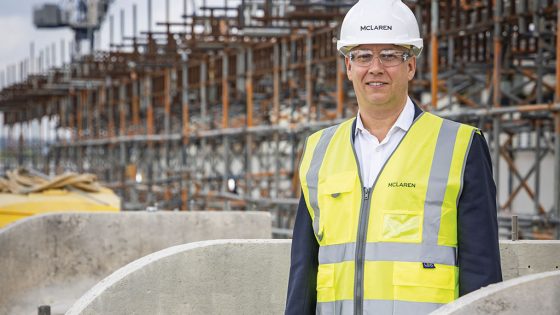The tier one firm isn’t getting distracted by the bright lights of London
These are busy times for contractor McLaren. The firm is engaged in a host of projects throughout the country, staying true to its roots in the logistics and warehousing sectors. At the same time, it is working on high-profile new-build, refurbishment and expansion projects in London.
These include the £132m transformation of the former House of Fraser store at 318 Oxford Street into a commercial and retail development for Publica Properties Establishment.
But when meeting Construction News in McLaren’s plush site office there, group chief executive Paul Heather pushed back at the suggestion the scheme is the firm’s “flagship” project. “We don’t want to forget what we are,” he said. “And we also don’t want to turn our back on any of our history. There’s an industrial logistics thread that runs through the business, particularly in the Midlands and the North. And the relationships the senior team have in that part of the group are the best I’ve seen for repeat business.”
Heather’s career saw him spend 18 years at Skanska, followed by four more at Sir Robert McAlpine. He joined McLaren two years ago as group managing director of construction, moving up to the group chief executive role last November.
With McLaren approaching the end of its financial year on 31 July, Heather reflected on difficult market conditions. “We’re doing what we said we’d do at the start
of the year,” he said, adding that the firm should “there or thereabouts” meet its target of £1bn turnover in 2023/24.
“The only challenge that we have along the way – and it’s an industry-wide issue – is that projects are taking longer and longer to start. I’d say that in the past five years the average time to start on site after a contract award has doubled from three to six months.”
This year has been tough, Heather added. “We don’t seem to see or feel any respite in terms of the amount of time, effort and energy that needs to go into delivering and winning projects.”
Tough tenders
Rather than a sprint, every tender is now a “marathon”, in Heather’s view. “So it’s tough and you’ve got to be on your ‘A’ game. You’ve got to have the right personnel, skills and expertise to demonstrate you can deliver, and you’ve got to know the scheme inside out in a technical sense.”
He added that people can get a bit battle-weary along the way in a lengthy tender process, but there are still benefits to be gained, especially in forming alliances with supply-chain partners. In
his opinion, the journey to a contract win almost matters as much as the additional turnover. “It’s very important. We spent time building relationships even if we didn’t win every tender – but we have a reasonable strike rate in winning them.”
Even with tricky projects, Heather said it is possible to gain from adversity. “We know of projects that have been challenging and very difficult. But these are the ones you have to wrap your arms around even more, because the people involved will benefit from the learning experience.
“Every project will have challenges – it’s how you overcome them that’s important.”

